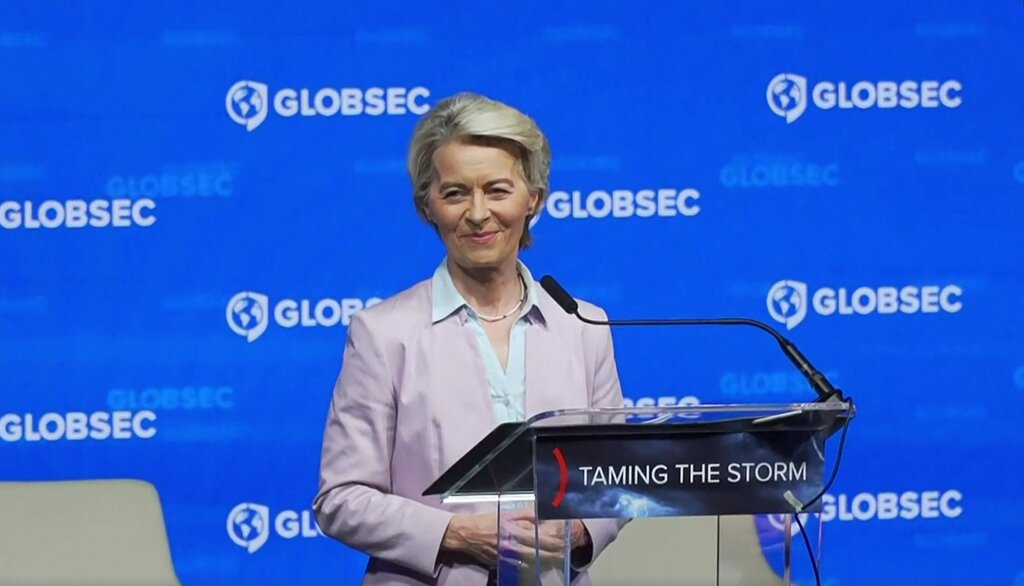Von der Leyen recalls 1956 Soviet occupation to send message to Hungarian government

At this year’s GLOBSEC conference, Ursula von der Leyen addressed leaders from several Central and Eastern European countries, highlighting the importance of the region to the EU, the war in Ukraine, and the Hungarian government’s foreign policy stance.
At the GLOBSEC conference on regional security, Ursula von der Leyen indirectly addressed the Hungarian Prime Minister in her keynote speech with a pointed reference to the 1956 Soviet occupation of Hungary, reports 444.hu. Although the President of the European Commission did not mention Viktor Orbán by name, the intent of her message was unmistakable.
Central and Eastern European states meet in Prague
GLOBSEC is a non-partisan, non-governmental organisation based in Slovakia, which holds the annual GLOBSEC Forum on foreign policy, security, European affairs, and the economy. According to the GLOBSEC Forum’s website, the event is “the convergence point for key figures in politics, business, think tanks, NGOs, international organisations, academia, and innovation,” with the aim to “underscore Central and Eastern Europe’s growing significance in upholding global stability.”
In 2024, the forum is hosted in Prague, where, from 30th August to 1st September, discussions will focus on four key themes: (re)defining the global order, from war to just peace, charting the GeoTech frontier, and Europe’s make-or-break moment, with more than 1,500 participants expected from over 70 countries.
This year’s event was opened by Czech President Petr Pavel and European Commission President Ursula von der Leyen, who delivered her first public speech since being re-elected for a second term as Commission President.

Photo: PrtSc / European Commission Press release
Von der Leyen: some EU leaders are “muddying the waters of our conversation about Ukraine”
Von der Leyen began her keynote speech by emphasising that “Central Europe is not only geographically at the heart of Europe. It is also politically and strategically central to the future of the European Union.” Highlighting the dynamism of the Czech and Polish economies, she remarked that “when we talk about competitiveness, I think Europe’s West has a lot to learn from Europe’s East.”
Beyond the economy, the region has demonstrated “impressive strength” in response to the war in Ukraine, becoming “the beating heart of European solidarity.” Reflecting on two and a half years of Russia’s invasion, she noted that “Peace cannot be taken for granted. You warned us years ago about Putin’s intentions. Well, we should have listened more closely to Central and Eastern Europe.”
However, von der Leyen continued: “Today, some politicians inside our Union, and even in this part of Europe, are muddying the waters of our conversation about Ukraine.” These politicians blame the war not on “Putin’s lust for power but on Ukraine’s thirst for freedom.” Although she did not name Viktor Orbán directly, her words were clearly directed at the Hungarian Prime Minister. This became even more evident when she posed the question:
“Would you ever blame Hungarians for the Soviet invasion of 1956?”
She went on to state that when the Soviets invaded Hungary, or when they suppressed the Czechs in 1968, “The Kremlin’s behaviour was illegal and atrocious back then. And the Kremlin’s behaviour is illegal and atrocious today.” Von der Leyen concluded that peace is not synonymous with surrender, nor is sovereignty synonymous with occupation. Therefore, politicians who argue “to stop support for Ukraine do not argue for peace. They argue for appeasement and the subjugation of Ukraine.”
Peace, she continued, is not simply the absence of war, but rather*“a settlement that makes war impossible and unnecessary.” Such a peace effort, she argued, should focus on the integration of Ukraine into the EU and a rethinking of Europe’s security architecture, particularly concerning Europe’s dependence on Russian energy and its means of self-defence.
Read also:
- Foreign ministry: Brussels trying to pressurise Hungary into taking pro-war stance for years
- Here is what the Hungarian government is asking of Brussels
Source: 444.hu






